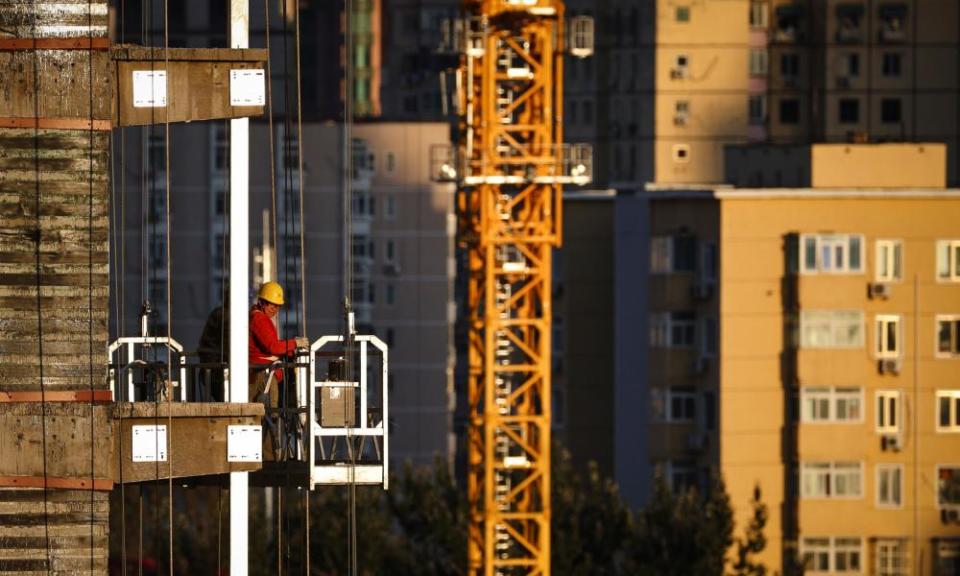China’s indebted property sector highlights a fading economic revival

Xi Jinping’s mission is not only to control the housing bubble, but rein in untethered industries and foreign capital
China’s economy has become heavily dependent on property development over the last decade. High-rise apartments have mushroomed across hundreds of cities to house a growing white-collar workforce, while glass and steel office blocks are dominating city centres, mimicking Shanghai’s glittering skyline.
Valued at more than $50tn after 20 years of rapid growth, Chinese real estate is worth twice as much as the US property market and four times China’s annual income.
George Magnus, an associate at Oxford University’s China Centre, says this real estate market ranks as the most important single commercial sector in the world.
Leaders in Beijing, aware that the boom was running out of steam before the pandemic hit, have spent the last year trying to bring the ballooning, largely private-sector industry painlessly down to earth. Tighter regulations have curtailed borrowing binges and speculative building projects have begun to dry up.
The overhang of debts in some companies has proved trickier to deal with, especially after it emerged that China Evergrande, one of the largest developers, owed $300bn.
Funded by a growing Chinese middle-class and borrowings from international investors, Evergrande has grown to own more than 1,300 projects in more than 280 cities across China.
Like many indebted companies, Evergrande used fresh loans to pay off old maturing loans until investors, concerned about its stability, refused to play ball without a huge hike in interest payments.
In recent days the company’s share price has plunged and City analysts believe any ability to escape a government bailout has all but evaporated.
Kaisa is another developer that has fallen into the same trap. It cannot find investors to finance fresh loans at interest rates it can afford.
Such is the pressure on these companies, the central bank has eased short-term borrowing costs and is poised to go further with a cut to the headline interest rate.
Property, though, is only one of Beijing’s headaches. The economy’s recovery is petering out and inflation is increasing, as it is in many other parts of the world.
The Communist party leadership has also embarked on a battle for control of industries that have managed to secure a degree of autonomy. Xi Jinping, China’s president, is especially concerned that hi-tech businesses have become untethered from state control.
It irks the Chinese leadership that Naspers, a Cape-Town-based tech investor, injected just $32m, in 2001, into an obscure internet firm that went on to develop the popular messaging and payment service WeChat. The internet services provided by that company, Tencent, are now used by hundreds of millions of Chinese, and Naspers’ shares are worth more than $200bn.
Last year Beijing blocked the $37bn flotation in New York of the Ant Group’s affiliate company Alibaba and this year began to accuse billionaire tech owners of ignoring consumer rights and data privacy, fuelling excess debt, and fostering economic inequality.
More than $1tn was knocked off the value of Chinese companies, but this failed to deter Xi.
According to government sources who have spoken to the Financial Times, Beijing is preparing to force tech start-ups to raise money in China, restricting the main channels used to attract international capital.
A hit-list of new companies in sensitive sectors has been drawn up to prevent their using variable interest entities (VIEs) to run their China businesses. VIEs are a legal structure used for decades by Chinese tech groups, including Alibaba and Tencent, to circumvent foreign investment restrictions and raise billions of dollars from international investors.
Diana Choyleva, a renowned China watcher and head of the independent consultancy Enodo Economics, said: “China no longer wants to list its best companies and its potential future tech stars abroad – both from national security considerations as well as because it wants to offer better investment choices for domestic investors. The new Beijing stock exchange was just opened to serve innovation-oriented small and medium-size firms.”
In the last week, the ride-hailing group Didi Chuxing has said it will delist from the New York stock exchange. Choyleva said the move was not so much to restrict foreign ownership of shares in Chinese companies as to make them purchase through domestic stock exchanges under the watchful eye of China’s financial regulators.
“It’s not clear whether China is also banning foreign investors from buying these assets in domestic markets. I think it is much more about restricting and eliminating the VIE funding route.”

 Yahoo Finance
Yahoo Finance 